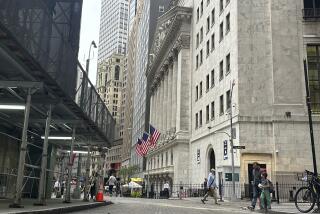FINANCIAL MARKETS : Bond Yields Tumble on Low Inflation News
Treasury bond yields plunged Friday to four-month lows on new signs that the economy is slowing.
On Wall Street, the economic news sent investors bailing out of industrial stocks and into more stable growth stocks, leaving the market mixed overall. Gold, the premier inflation hedge, sank.
The markets were driven by the government’s estimate that the economy grew at a 4.5% annualized rate in the fourth quarter, with no evidence of alarming inflation.
More important, included in the growth report were hints that activity may soon slow. In particular, analysts pointed to a rapid buildup of unsold goods in inventories.
Many bond traders, convinced that slower growth with still-low inflation could allow long-term interest rates to slide, pushed the yield on the 30-year Treasury bond to a four-month low of 7.73% from 7.83% on Thursday.
Shorter-term rates also plummeted. The 5-year T-note yield fell to 7.57% from 7.70% Thursday.
Analysts said the bond market still expects that the Federal Reserve, meeting next week, will raise overnight interest rates at least 0.50 point. But more investors now appear to believe that the Fed, which began tightening credit a year ago, is nearly finished--assuming the economy indeed slows.
“There are signs, whether the Fed raises interest rates or not (next week), we are headed toward a very different 1995--much slower growth,” said Hugh Johnson, analyst at First Albany Corp.
Despite bonds’ rally Friday, some analysts are nervous ahead of key economic reports due next week, including January employment. Investors will want to see more signs of weaker growth before driving bond yields lower, experts say.
But the stock market’s action Friday strongly suggested that more investors are betting on an economic slowdown. The Dow industrials eased 12.45 points to 3,857.99, weighed down by losses in “cyclical” stocks whose earnings are tied to a robust economy.
Meanwhile, classic consumer growth stocks surged as buyers sought out companies whose earnings generally grow at a predictable rate regardless of economic swings.
Overall, the market viewed the slide in bond yields positively: Winners topped losers by 4 to 3 on the NYSE, and most broad market indexes rose despite the Dow’s dip.
Among Friday’s highlights:
* Industrial issues tumbling included Alcoa, off 3 1/2 to 81; Dupont, down 1 1/2 to 54 1/2; International Paper, off 2 1/4 to 73 1/4, and Union Carbide, down 1 3/8 to 26 1/4.
* Classic growth issues gaining at industrial stocks’ expense were led by Walt Disney, which rocketed 3 to an all-time high of 50 1/4 after reporting sharply higher quarterly earnings and presenting an upbeat outlook to analysts in a two-day meeting in Los Angeles.
Other consumer issues soaring included McDonald’s, up 1 1/2 to 32 1/4 after its earnings report; Procter & Gamble, up 1 3/4 to 64 3/4; Gillette, up 1 7/8 to 76; Pepsico, up 3/4 to 36 3/8; Colgate Palmolive, up 2 5/8 to 61 3/4, and Philip Morris, up 1 1/2 to 60 5/8.
* Technology issues were mixed on earnings news. Legent fell 4 to 30 1/4 after its quarterly report, but Texas Instruments rose 2 1/8 to 71 5/8 on its report.
In commodities trading, near-term gold futures slumped $4.80 to $376.80 an ounce as inflation concerns waned.
Foreign stock markets were mixed. Tokyo’s Nikkei-225 index added 33.51 points to 18,104.35, while London’s FTSE-100 index rose 14.9 points to 3,022.2.
But in Seoul, the composite index hit a seven-month low, down 20.80 points to 907.05. And Mexico City’s Bolsa index fell 60.96 points or 3% to 1,957.65 on growing fears that a U.S. financial bailout of Mexico won’t pass Congress.
More to Read
Inside the business of entertainment
The Wide Shot brings you news, analysis and insights on everything from streaming wars to production — and what it all means for the future.
You may occasionally receive promotional content from the Los Angeles Times.










